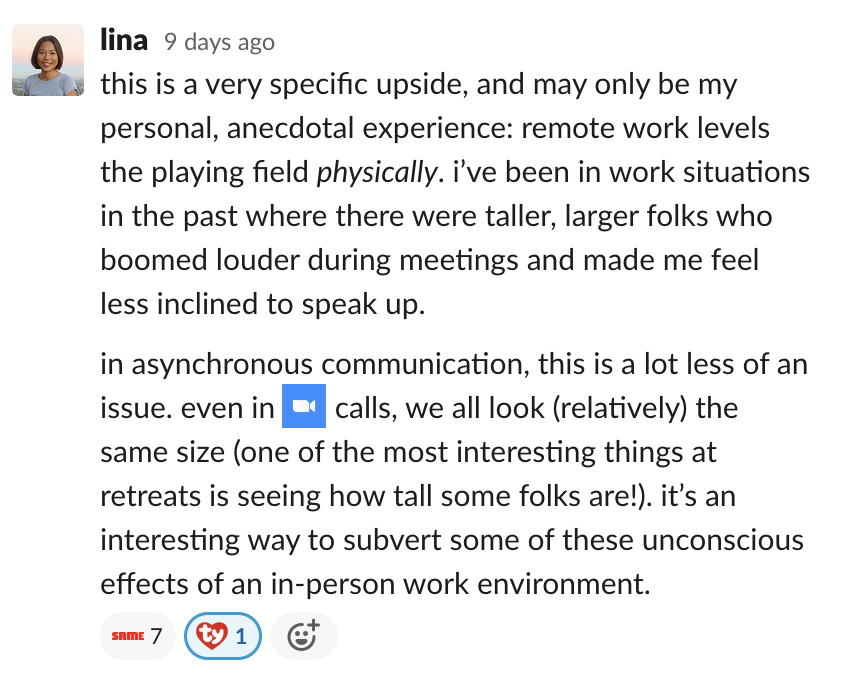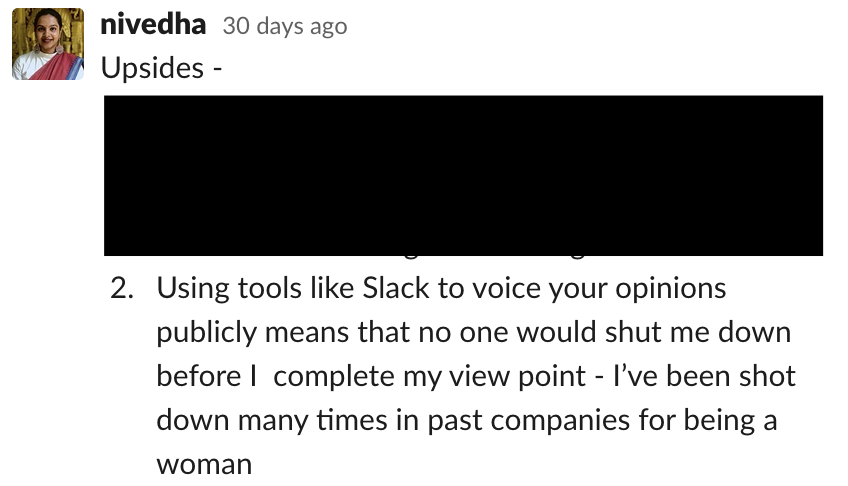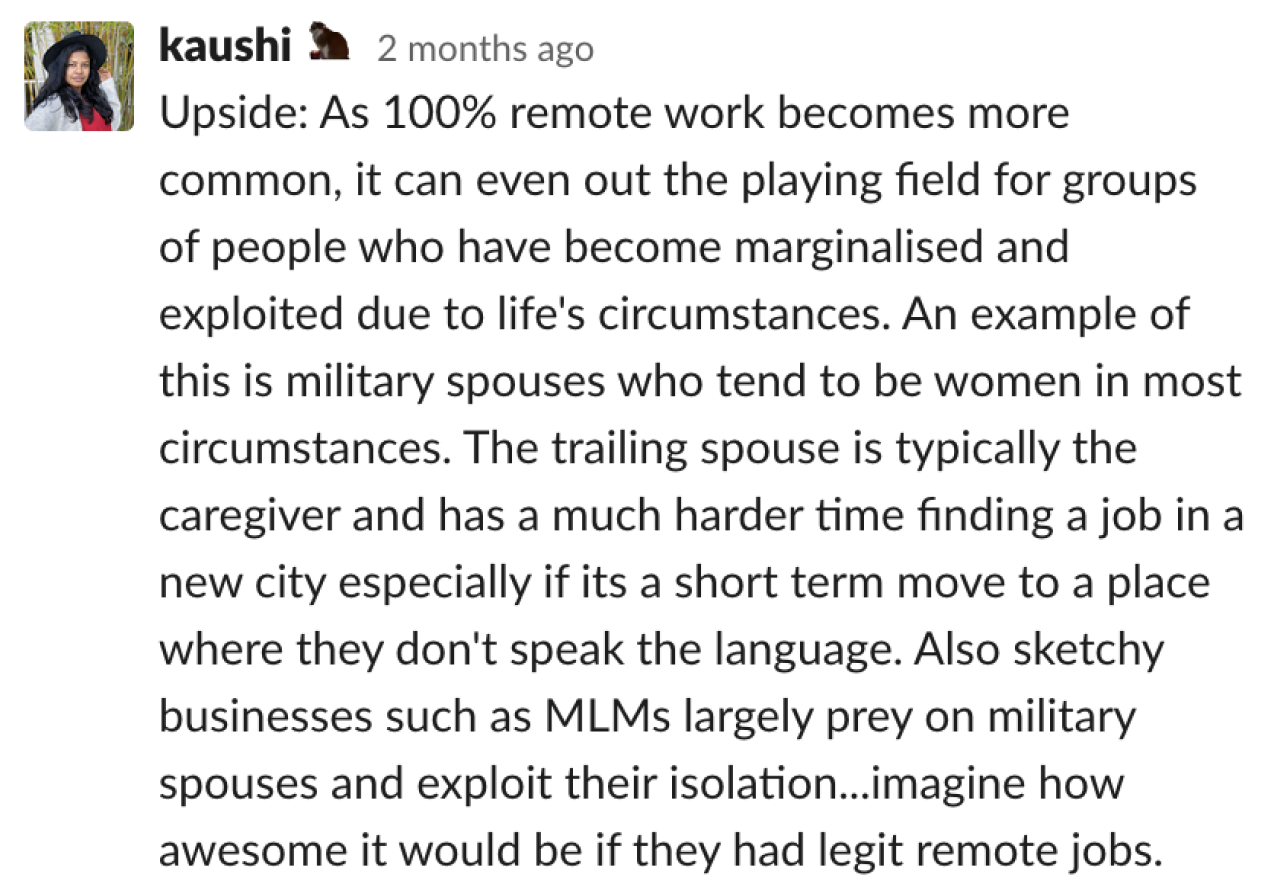The benefits of remote work for women
- Get link
- X
- Other Apps
Women in remote work face plenty of the same issues as women in a typical office, including the very real gender pay gap that exists no matter where you work. But working remotely creates a unique set of circumstances—good, bad, and just different—that affect women's professional experiences.
Zapier recently released our remote work report, and one of our findings stood out: women are more likely to want to work remotely, but they're less likely to be given the option.
According to our survey, female knowledge workers are more likely than male knowledge workers to say the option to work remotely is one of the work perks they would most prefer to be offered (62% vs. 53%) and that home is where they would be the most productive when working (50% vs. 37%). At the same time, female knowledge workers are more likely than male knowledge workers to say they don't work remotely because their company does not allow it (40% vs. 25%), and that they have quit a job because the company didn't offer a flexible work schedule (24% vs. 17%).
When I asked my female coworkers about their experiences working at a distributed company, their answers supported these findings: they had overwhelmingly positive things to say about being women in remote work. What follows is just the tip of the iceberg.
Remote work is a relatively new field, which means there isn't a ton of data on its effects, especially as it relates to gender. In fact, the various reports on the topic often present contradictory findings. That's why I've rooted this piece in anecdotes that are backed by data on non–remote work topics.
Keeping personal choices personal
When people talk about women in remote work, it's often a discussion about being a mom in remote work. And I get it: I'm a woman and a mom. When I think about the best parts of working from home as a woman, a lot of what comes to mind is mom stuff. But we need to be sure that we don't equate "working women" with "working moms." Most of the parental benefits of working remotely benefit both moms and dads: things like getting more time with kids every day (no commute) and more flexibility to be involved with kids' lives.
Another benefit for all parents who work remotely is the freedom to make non-public choices about their children. But, of course, there's one that's specific to women: breastfeeding.
I had my first kid while working in an office full-time. I chose to breastfeed, so I had to walk through an open office three times a day with my pump bag and ask my boss to leave so I could pump in his office, the one room with shades I could pull down. Pump bags look like regular bags, so people would constantly ask, "Where are you headed?" which was…awkward.
I had my second kid six months ago, while working at Zapier. As a remote worker, I can pump without it being a public display of my personal decisions every time I do it. None of my coworkers need to know whether or not I breastfeed, let alone exactly when I'm about to go pump 15 feet from where they're working.
Removing the bias of physical stature
When I asked for insights in our #fun-women channel at Zapier, our content designer, Lina Koh, commented on something that she thought might just be her personal experience:

But it turns out it's not just Lina. While researchers are yet to land on exactly why, multiple studies have shown that taller people are generally favored in work environments: they make more money, hold more leadership roles, and even feel more confident about their work.
And yes, there are plenty of tall women out there, but the average height of men in the U.S. (5'9") is almost half a foot taller than the average height of women (just under 5'4"). That means that a remote environment levels the playing field for one of the many examples of unconscious bias against many women that exist in person.
Putting communication on equal footing
Studies dating back to the 1970s and as recently as 2014 have shown that women are more likely to be interrupted (by both men and women). Zapier Customer Champion Nivedha Venkatesh notes that remote communication can help with that issue.

Remote work, especially when it's asynchronous, leans heavily on written communication. That means fewer chances for being interrupted, at least in the traditional sense. Remote communication, in theory, allows everyone equal opportunity to express their ideas in full without being cut off.
Opening opportunities for marginalized groups
In some cases, remote work is the only option for an individual. There are a whole slew of reasons why that might be, but Zapier Customer Champion Kaushi Bandara noted the benefits of remote work specifically for marginalized women.

The mere existence of remote work allows military spouses (who, as Kaushi points out, are 93% women) to find work. With a 24% unemployment rate for military spouses (compared to about 4% nationally), an increase in remote work opportunities could make a huge difference.
This extends beyond military spouses as well. Research overwhelmingly shows that heterosexual couples are more likely to relocate for a man's job than the woman's. While recent research suggests this is because of the types of jobs that men choose, it still means that women are more likely to be what's known as the "trailing spouse." Remote work allows these women to stay at the same job even when they relocate for their husband's career.
Being a woman in remote work can be a struggle—especially with issues of visibility being exacerbated. But women want to work remotely, and remote work offers advantages for women in the workplace, mitigates biases against them, and creates opportunities that they might not otherwise have.
from The Zapier Blog https://ift.tt/32T13YN
- Get link
- X
- Other Apps
Comments
Post a Comment